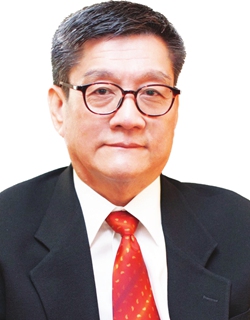China's system gives it continuity and consistency in policymaking: Malaysian scholar

Shanghai highways at night. Photo: VCG
Editor's Note:
For Chinese people, the past decade has been epic and inspirational. The country, under the leadership of the Communist Party of China (CPC) Central Committee with Comrade Xi Jinping at the core, has made great endeavors in boosting its economy, deepening reforms, improving the rights of its people and acting as a responsible global power.
Koh King Kee (Koh), president of Center for New Inclusive Asia, a non-government Malaysian think tank, told the Global Times (GT) reporter Li Aixin that the CPC's long-term development plans ensure continuity, and it cannot be overstated that China's economic stability is vital to the stability of the global economy.
This is the 23rd article of the Global Times series about this special decade.
GT: In a recent interview, you said that there would be no globalization today without China's active participation. President Xi Jinping proposed the Global Development Initiative (GDI) last year. What role do you think the GDI plays in globalization at the moment and in the future?
Koh: The international system is now under stress and globalization is increasingly strained due to heightened geopolitical tensions and disruptions caused by the COVID-19 pandemic, exacerbated by the Ukraine War.
Globalization is crucial to developing economies which depend on export and FDI for growth. The GDI put forth by President Xi which aims to "steer global development towards a new stage of balanced, coordinated and inclusive growth" is, therefore, timely and imperative.
By prioritizing poverty eradication and promoting green and low-carbon development, the GDI could also help developing economies to accelerate the momentum for achieving the UN 2030 Sustainable Development Goal.
Development which holds the key to people's wellbeing is premised upon peace. As UN emphasizes, "there can be no sustainable development without peace and no peace without sustainable development." The GDI will, therefore, contribute to global peace and development, and the maintenance of international order underpinned by the principles of the UN Charter.

Koh King Kee Photo: Courtesy of Koh
GT: Former Malaysian prime minister Mahathir Mohamad recently blamed Washington for ratcheting up tensions in region and suggested ASEAN to move toward China after US' Taiwan "provocation." He also said that China's philosophy — unlike the West — was not to conquer and occupy nations. What's you take on Mahathir's stance? According to your knowledge, what is ASEAN's mainstream attitude in this regard?
Koh: Dr Mahathir has always maintained his view on China since his tenure as prime minister of Malaysia that China and Malaysia have long historical ties, acknowledging that China never attempted to conquer Malaysia or any ASEAN country.
China believes in "coexistence in harmony with all nations" in dealing with country-to-country relations. China's good neighborliness policy with ASEAN countries is a manifestation and concrete application of this spirit.
Maintaining ASEAN centrality and not taking sides in the China-US major power competition is the consensus of ASEAN member states. Maintaining its neutrality is vital for ASEAN to protect its own interests as geopolitical tension heightens in the Asia-Pacific region.
Dr Mahathir's suggestion that ASEAN should move toward China after US' Taiwan provocation is his personal view. It is unlikely that his view will have any immediate influence on the relationship between ASEAN countries and China or the US.
GT: Based on your observations and your experiences in dealing with China, what's the biggest misunderstanding in the US about China over the past decade?
Koh: China's rise has inevitably changed global power dynamics. The US deems China's rise as a challenge to its global supremacy and posing a threat to the liberal international order. It regards China as "the only competitor potentially capable of combining its economic, diplomatic, military, and technological power to mount a sustained challenge to a stable and open international system."
The fact is: China has benefited and realized its development within the current world order. It has no intention of destroying it, much less supplanting it. However, as a country which now accounts for over 18 percent of world GDP and contributed close to 30 percent to global growth annually in the past decade, China rightfully would want to have a bigger say in shaping the international system to be one that is fairer and more just.
In fact, it is US' reluctance to accept China's rise and treat it with respect, for fear of losing its global supremacy, that creates the "misunderstanding." Unless, and until, US wakens up to the reality, its "misunderstanding" of China will remain.
GT: You said that CPC has provided a good governance model for the world. Would you elaborate on the view? Which aspect of China's development over the past 10 years has attracted most of your attention and why?
Koh: Underpinning China's success is CPC's people-oriented philosophy of governance and remaining true to its founding spirit of seeking happiness for the masses. People are the master and always take the centre stage in China's polity, socially, politically and economically.
Common prosperity is an essential requirement of socialism. Economic growth must benefit all. Over the past 10 years, CPC has adopted a slew of development policies and administrative measures to reduce income inequality, narrowing the wealth gap, and building a just and fair moderately prosperous society.
Poverty reduction, revitalization of rural economy, acceleration of urbanization, and making available internet technology and e-commerce to even remote villages are some of the important steps that China has taken during the last decade to reduce the rural-urban divide .
Furthermore, anti-monopoly policy and efforts to build a unified national market will improve market efficiency and promote healthy competition. Infrastructure development in the northwest and southwest provinces will no doubt ensure a more balanced regional development.
China is committed to build a beautiful country through green development. "Mountains and rivers green are mountains of silver and gold," President Xi has said. China is now the indisputable global leader in renewable energy; more than one-third of global cumulative solar PV and onshore wind capacity will be located in China.
In short, China's people-oriented governance philosophy, its efforts to build a fair and just society, its measures to promote an efficient market and green development are lessons and experiences worthy of learning by other countries.
GT: In your opinion, what's the biggest difference between CPC governance and the US elite politics? Why have US media and politicians continued to smear China's political system?
Koh: CPC's whole-process people's democracy enables people from all walks of life to actively participate in the day-to-day political activities at all levels. Conversely, elite politics in the US is basically the game of the rich and the powerful. The large majority of people do not hold power and the interests of minority groups, or the poor are often neglected or overlooked.
There are obvious strengths in China's political system as evidenced by its miraculous economic achievements and the effectiveness of whole-of-nation's approach in handling major disasters such as earthquakes, floods or the sudden outbreak of an epidemic. In contrast, conflicts and partisan interest are difficult to reconcile in a multiparty system, which invariably affect the efficacy and efficiency of the government.
US media and politicians keep smearing China's political system as Washington defines US-China competition as a competition between democracy and autocracy, and the US must win to show that democracy is a better governance system that can deliver.
GT: What advantages does transcending the election cycle give the CPC in governing? What does China's stability and certainty as a major power mean for the world?
Koh: China's centralized system allows CPC to formulate long-term development plans and ensures continuity and consistency in the implementation of government policies rather than focusing on short-term populist measures to gain political mileage, as in Western democracies.
As the world's factory and top trading nation with more than 120 countries and regions as its main/major trading partner, China is the backbone of the global supply chain. It is the growth engine of the world and acts as a ballast stone of the global economy in times of uncertainty. It cannot be overstated that China's economic stability is vital to the stability of the global economy, more so as the world is now beset by geopolitical conflicts and the far reaching impact of pandemic.
GT: There are many predictions about China's future in the West and different comments on China's development path. Are you optimistic about China's future development?
Koh: Despite the economic shockwaves triggered by the pandemic and the Ukraine War, China's growth trajectory is expected to remain unchanged, albeit growing at a slower pace. Nevertheless, China is facing visible domestic headwinds due to the sluggish property market, local government debts, and disruptions caused by the zero-COVID policy.
With a large economy and population, and an effective government that can deliver, China's economy is evidently more resilient as shown during the 1997 Asian Financial Crisis and the 2008 Global Financial Crisis. Over the years, it has built a complete and efficient manufacturing ecosystem which is supported by a well-trained labor force. China's large pool of STEM talent coupled with its huge investments in new infrastructure such 5G, AI, big data centre, EV charging stations, etc., underlie its competitive strength in the 21st century global economy that will be driven by technologies and innovations.
China's consumer market is projected to double by 2030. It creates an irresistible gravitational pull for FDIs, especially now that China has turned to the Dual Circulation development strategy by placing a greater emphasis on the domestic market for growth.
Nonetheless, global trade and investments have been increasingly affected by geopolitical tensions, particularly US' relentless suppression of Chinese hi-tech companies. China must deepen its reform, be open and inclusive to counter US coercive containment.

